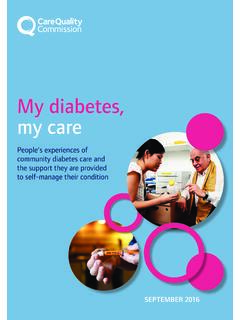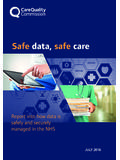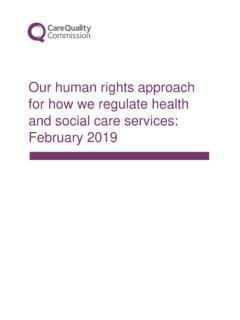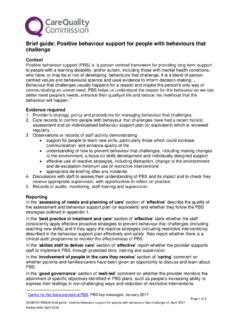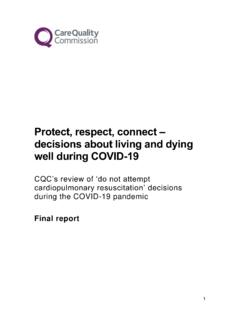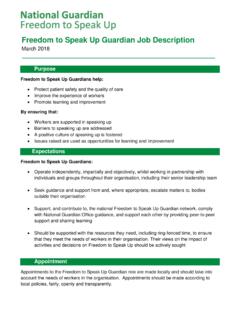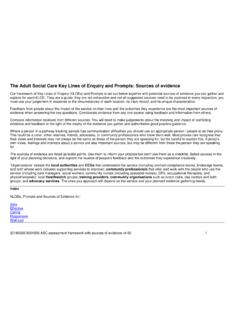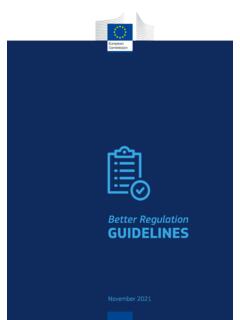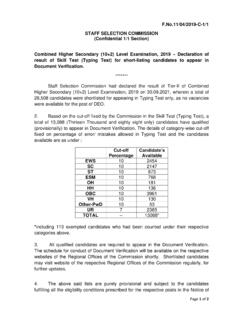Transcription of Disclosure and Barring Service (DBS) checks
1 20191031 100646 Disclosure and Barring Service DBS checks guidance v7 1 Registration under the Health and Social Care Act 2008 Disclosure and Barring Service (DBS) checks (formerly criminal record (CRB) and Barring checks ) October 2019 20191031 100646 Disclosure and Barring Service DBS checks guidance v7 2 Summary 4 Disclosure and Barring Service (DBS) checks 5 1. Disclosure and Barring Service (DBS) checks ? 5 2. Why are DBS checks important? 5 3. What type of checks can be made? 6 4. What is the difference between a criminal record check and a barred list check? 6 5. What is a standard DBS check? 6 6. What is an enhanced DBS check? 7 7. When can someone apply for an enhanced DBS check without barred list information? 7 8. What is an enhanced DBS check with barred list information?
2 8 9. Who can apply for an enhanced DBS check with barred list information? 9 Registration with CQC 10 10. Who needs a DBS check when registering with CQC? 10 11. How does someone applying to become a registered person apply for a CQC countersigned DBS check? 10 12. What is CQC s approach to applications for registration from people who have committed offences? 11 13. Portability: can DBS checks be used for more than one application for registration? 11 Providers' own DBS checks for staff 12 14. What are health and adult social care providers expected to do when employing new staff ? 12 15. How do providers ask for a DBS check? 13 16. How do providers apply for barred list checks ? 14 17. What if a provider needs a new member of staff to start work urgently? 15 18. What are the Adult First supervision arrangements for new staff in a 16 domiciliary care agency?
3 19. Who does the DBS send the certificates to? 17 20. Where do the police send further relevant information? 17 21. Do providers new to registration have to apply for retrospective DBS checks on their staff ? 18 20191031 100646 Disclosure and Barring Service DBS checks guidance v7 3 22. Are retrospective checks needed for staff who have been employed for a long period without having a check and who fall within the criteria for a DBS check? 18 23. Do providers have to get a criminal record check on staff recruited from abroad? 18 24. How does CQC check if DBS checks have been carried out? 19 25. Do DBS checks have to be renewed? 20 26. Are providers responsible for making sure that staff supplied from an agency have had DBS check?
4 21 27. What arrangements are in place for people employed by NHS Professionals (the NHS in-house staff agency)? 21 28. What arrangements are in place for NHS doctors in training? 21 29. What happens if the DBS has any queries about an application? 21 30. Can DBS checks be used for more than one job application? (this is sometimes referred to as portability) 22 31. Is there more CQC information about criminal record checks ? 22 Links to further information 22 Appendix A: Legislative changes introduced on 10 September 2012 that affect the Disclosure and Barring Service 23 Appendix B: Regulated activity adults 24 Appendix C: Regulated activity children 25 20191031 100646 Disclosure and Barring Service DBS checks guidance v7 4 Summary There are two main situations when people working in health and adult social care services registered under the Health and Social Care Act 2008 (HSCA) will need to consider having DBS checks : On registering with CQC.
5 When working in a health or social care Service providing activities including regulated activity as defined in the Safeguarding Vulnerable Groups Act 2006 (SVGA), which has been amended by the Protection of Freedoms Act 2012 (PoFA). This includes staff who provide health care in GP practices, other primary medical services and dentistry. This guidance will explain who needs to consider having a DBS check in each of the above situations and the process for applying. On 1 December 2012, the services of the Criminal Records Bureau (CRB) and the Independent Safeguarding Authority (ISA) merged, and the Disclosure and Barring Service (DBS) was created. Please note: 1. Regulated activity is a term common to both the regulation of care services under the Health and Social Care Act 2008 (HSCA), and to the process of Barring people from certain types of work.
6 The term means different things in the two different contexts. Regulated activities for the purposes of Barring are defined in the Safeguarding Vulnerable Groups Act (SVGA). In this guidance, regulated activity refers to those activities defined in the SVGA unless specifically described as a HSCA regulated activity. Appendices 2 and 3 provide detail of regulated activities defined in the SVGA. 2. In this guidance the term registered person(s) refers to providers/managers registered with CQC under the Health and Social Care Act 2008. 3. Text that links to other documents or websites is highlighted in blue and underlined. Ctrl and click over this text to go to the linked document. 20191031 100646 Disclosure and Barring Service DBS checks guidance v7 5 Disclosure and Barring Service (DBS) checks 1. Disclosure and Barring Service (DBS) checks ?
7 The role of the DBS is to help employers in England and Wales make safer recruitment decisions and prevent unsuitable people from working with vulnerable groups, including children. The DBS was established under the Protection of Freedoms Act 2012 and carries out the functions previously undertaken by the CRB and ISA. It is a non-departmental public body and provides a joined up Service that combines criminal records and Barring functions. The Service and processes previously provided by the CRB have not changed. In addition, the DBS maintains the Barring lists previously managed by the Independent Safeguarding Authority (ISA). When someone applies for a DBS check, the DBS checks the police national computer to see if there are any convictions, cautions, warnings or reprimands listed for the applicant. DBS may also ask the police to consider if they have any local police information about the person that is relevant to disclose.
8 In certain circumstances, and when it is applied for, the DBS will provide information about whether the person is barred from working with vulnerable groups, including children. From 17 June 2013, the DBS only sends the certificate to the person applying for the check (the applicant). Before this date, they also sent a copy of the certificate to the person who countersigned the application. The DBS also has duties and powers to share information with professional bodies such as CQC, the General Medical Council and other organisations. 2. Why are DBS checks important? DBS checks help to keep those who are known to pose a risk to people who use CQC registered services out of the workforce. Various inquiries into deaths and injuries of children and people using health or social care services have shown the importance of good recruitment practice.
9 For example, the Bichard inquiry stressed how important recruitment checks are in keeping people safe. However, DBS checks are only one aspect of ensuring effective and safe recruitment practices and should not be used in isolation. Providers should also use other mechanisms, such as checking employment history and any gaps, reviewing references, etc. to assure themselves as far as possible that all 20191031 100646 Disclosure and Barring Service DBS checks guidance v7 6 employees are of good character and are fit to work in their health or adult social care Service . 3. What type of checks can be made? The following DBS checks can be made: Standard check Enhanced check Enhanced check and barred list check (child) Enhanced check and barred list check (adult) Enhanced check and barred list check (child and adult).
10 4. What is the difference between a criminal record check and a barred list check? A criminal record check will reveal information relating to a person s criminal record. This includes convictions, cautions, reprimands and warnings. When an enhanced check is applied for, the police may also disclose relevant local police information. A barred list check will show if a person is barred, that is prevented, from working in a regulated activity either with children, adults, or both. To knowingly employ a person who is barred by the DBS to perform a regulated activity is a criminal offence. 5. What is a standard DBS check? Standard DBS checks show convictions held on the police national computer, including spent convictions, together with cautions, reprimands and warnings. Please note: a Court of Appeal judgement in January 2013 stated that the Disclosure of all cautions and convictions on a DBS certificate was incompatible with Article 8 of the Convention for Human Rights.
